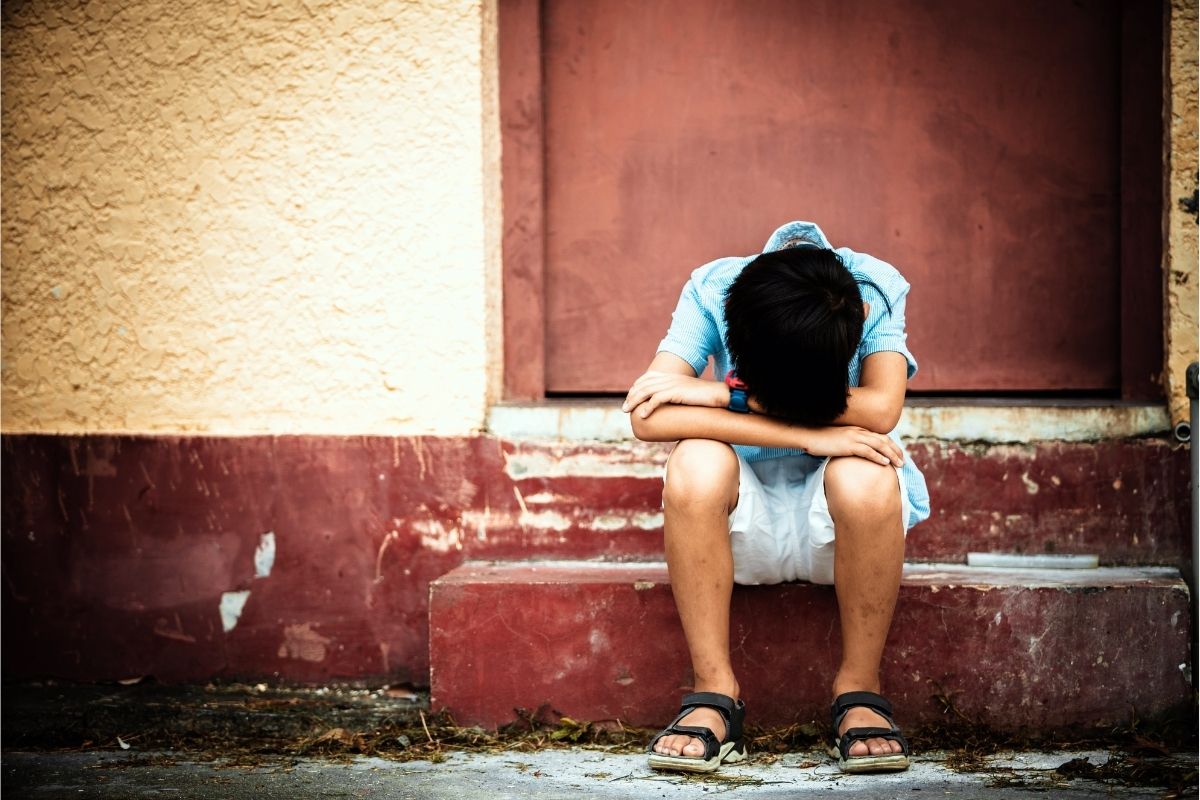What Is The Difference Between Fear And Anxiety?

Fear, anxiety, and stress are closely related emotions that involve feelings of worry or discomfort.
Anxiety typically comes before an event, while fear is a reaction to something that’s already happened.
Stress, on the other hand, is the pressure we feel from outside demands, like deadlines.
Fear is our gut reaction to danger, like being scared when we see a bear. It’s a direct response to a real threat to our safety. In these cases, fear makes sense and helps us avoid getting hurt.
Anxiety is similar to fear, but it often happens when the threat isn’t right in front of us or isn’t certain, like worrying about failing a test.
Stress is different. It comes from outside pressures that we need to deal with, like a work deadline. It doesn’t necessarily mean we feel directly threatened, which sets it apart from fear and anxiety.
The physical symptoms of these emotions can vary depending on the person and which part of the brain is activated.
People with anxiety usually feel shaky, nervous, or tense. Some even feel scared or panic. These changes can include:
– Sweating
– Shaking
– Trembling
– Shortness of breath
– Rapid heartbeat
You shouldn’t use any medications to treat anxiety without talking to your doctor or pharmacist first.
In young kids, anxiety often shows up as excessive crying, sleep problems, or restlessness.
As kids get older, they might become aggressive, isolate themselves, have trouble concentrating, or get frequent headaches.
For adults, doctors usually recommend using both medication and counseling.
The medicine works best alongside cognitive behavioral therapy (CBT) and relaxation techniques. So how does anxiety affect the body?
When someone feels anxious, their body goes into high gear. Their heart rate goes up, and blood starts pumping faster. Adrenaline floods the system, and breathing becomes shallow.
Blood vessels widen, making it harder to breathe.
This isn’t dangerous by itself, but it could make it hard for someone to handle situations that usually wouldn’t bother them.
For example, if someone was driving down the highway, they might start feeling anxious about approaching traffic lights.
Their body reacts by getting ready for action to avoid this.
By increasing blood flow to certain parts of the brain, adrenaline prepares the body to act. But high levels of adrenaline also make it hard to think clearly.
Without clear thinking, they might lose control of their car.
It’s worth mentioning that there are many types of anxiety disorders. Different types of anxiety need different treatments.
For example, some types of stress can be treated successfully with CBT alone.
Others need more intensive treatment involving drugs and/or psychotherapy.
Do I Have An Anxiety Disorder?
If you’ve been diagnosed with generalized anxiety disorder (GAD), you probably know that it means you worry a lot about everyday things.
You might find yourself constantly worrying about everything, from losing money to getting fired at work.
There are two main types of GAD. One type happens only once – called ‘pure’ GAD, and the other is called ‘chronic’ GAD.
Pure GAD tends to be less severe than chronic GAD.
This is because pure GAD usually happens when something triggers bad feelings – like losing your job – rather than happening all the time.
Chronic GAD is defined as lasting for three months or longer.
It can be hard to spot chronic GAD because you might not see a big difference in obvious symptoms.
While a doctor might first diagnose you with a different anxiety disorder, they might later diagnose you with chronic GAD.
This usually happens after running tests and seeing how your anxiety responds to treatment.
What Causes Generalized Anxiety Disorder?
We’re not exactly sure what causes GAD. But experts think it has several contributing factors:
– Genetic makeup. Studies show that people with family members who have depression or anxiety disorders tend to develop these conditions themselves.
– Stressful life events. These include serious illnesses, death in the family, divorce, money problems, relationship issues, moving house, starting school, getting married, or being separated.
– Life transitions. People who move away from home, get divorced, start a new job, or go back to college will experience more stress.
– Brain chemistry. Researchers think that some people might naturally produce too much serotonin, which helps control mood and behavior. This imbalance can lead to anxiety.
How Is Generalized Anxiety Disorder Treated?
There are many ways to treat GAD. Medication, therapy, and lifestyle changes can help control anxiety and reduce its impact on daily life.
Medications
Doctors often prescribe medications to treat anxiety in adults. However, they work best when used with behavioral therapies like CBT.
Behavioral Therapies
Behavior therapies focus on changing unwanted thoughts and behaviors through learning strategies. Examples include mindfulness training, exposure therapy, and cognitive restructuring.
Lifestyle Changes
Lifestyle changes can play a big role in managing GAD. For example, if you smoke, try to quit. Stop drinking alcohol if you can.
Keep a regular sleep schedule. Exercise regularly. Eat smaller meals during the day.
And take breaks throughout the day by going outside or doing another activity.
Support Groups
Talking to others who understand can be helpful. Support groups offer emotional support and information.
Many local and national organizations provide support groups for those dealing with anxiety.
Alternative Medicine
There’s growing research showing positive effects from using alternative medicine to manage anxiety.
For example, studies show that certain herbs have anti-anxiety properties. Several vitamins also seem to decrease stress and anxiety.
However, many of these remedies haven’t been thoroughly studied yet.
What Are Other Effective Treatments?
It’s normal to feel anxious about being anxious. You might worry that you’ll make yourself worse if you talk to your doctor about how you’re feeling.
But talking to someone else about your feelings can actually help ease them.
There are different types of support groups for people with anxiety problems.
For instance, some focus on specific issues, while others address general anxieties.
Support group members usually meet regularly in person or online to chat with other people going through similar situations.
Another option is to join a group at a local library. Online forums are great resources too.
Many websites offer tips and advice for managing stress, anxiety, and related conditions.
What Are Some Other Common Types Of Anxiety Disorders?
Social phobia is when someone feels extremely anxious about interacting with other people socially. Social anxiety might make you avoid social situations, stay in your room or even leave the country.
You might feel scared about meeting new people or talking to strangers.
As a result, you might isolate yourself from friends and family.
Specific phobias involve intense fears about particular objects or situations.
People with specific phobias tend to overreact to perceived threats and become anxious because of their fears.
Phobic disorders are common among children and adults.
Obsessive-compulsive disorder (OCD) involves recurring intrusive thoughts and images and repetitive behaviors like handwashing, counting, hoarding, and checking.
Obsessions refer to obsessive thoughts that might include aggressive, sexual, or religious themes.
Compulsions are rituals performed to cope with obsessions.
OCD might affect school performance, job productivity, and relationships.
Post-traumatic stress disorder (PTSD) develops when someone experiences an event or series of events that cause serious injury, death, or physical threat.
PTSD often results in nightmares, flashbacks, and avoiding reminders of the trauma.
Panic disorder is an anxiety disorder involving sudden episodes of terror and fear.
The attacks are unpredictable, severe, and last up to thirty minutes.
During these “attacks,” people experience shortness of breath, sweating, dizziness, and numbness.
They might also experience chest pain, heart palpitations, shaking, trembling, and choking sensations.
Sufferers typically try to control themselves through breathing exercises and muscle relaxation but find this difficult.
Postpartum depression has both psychological and physical components.
Women who experience postpartum blues can be reassured by knowing they’re not alone in their sadness.
However, if these mood swings last for weeks or months, then it’s time to see a doctor.
Depression leads to changes in sleeping patterns and appetite. A woman experiencing this condition feels sad, irritable, and guilty.
She might lose interest in activities she once enjoyed, like spending time with her baby. She might sleep poorly and eat little or overeat.
This state of mind can continue for weeks or months.
If left untreated, depression can lead to complications like low birth weight, premature delivery, and suicidal thoughts.
Are There Any Natural Treatments For Anxiety Disorder?
Many natural treatments for anxiety include herbal remedies and meditation.
In fact, some studies have shown that certain herbs can help boost serotonin levels, which helps reduce stress.
Homeopathy is another effective way to treat symptoms of anxiety.
Most Anxiety Symptoms Are Normal
If you’re worried about having anxiety attacks, they might not be a sign of a big disorder.
Most anxiety symptoms fall into one of four categories: everyday concerns, worrying too much, worrying about nothing at all, or panic attacks.
You might not be suffering from long-term anxiety because most common anxiety symptoms are completely normal.
Consequences Of Stress And Anxiety On Your Body
Stress can impact all aspects of our lives. From simple tasks to more complex ones, we constantly face challenges and stressors in life.
We have to learn to cope with these challenges and stressors and handle them appropriately.
Unfortunately, if we don’t manage stress properly, it might result in physical ailments and diseases.
Moreover, chronic stress can also contribute to the development of psychiatric illnesses, such as anxiety.
Final Thoughts
Stress is unavoidable. However, learning how to deal with stressful events and circumstances can greatly improve your overall quality of life.
If you need help coping with stress, seek the help of a qualified counselor who can provide you with the tools necessary to effectively manage stress in your life.
A healthy lifestyle, regular exercise, enough sleep, and good relaxation techniques can help you overcome stress and anxiety.

Author: Michelle Landeros, LMFT
Michelle Landeros is a Licensed Marriage Family Therapist (LMFT). She is passionate about helping individuals, couples and families thrive.









